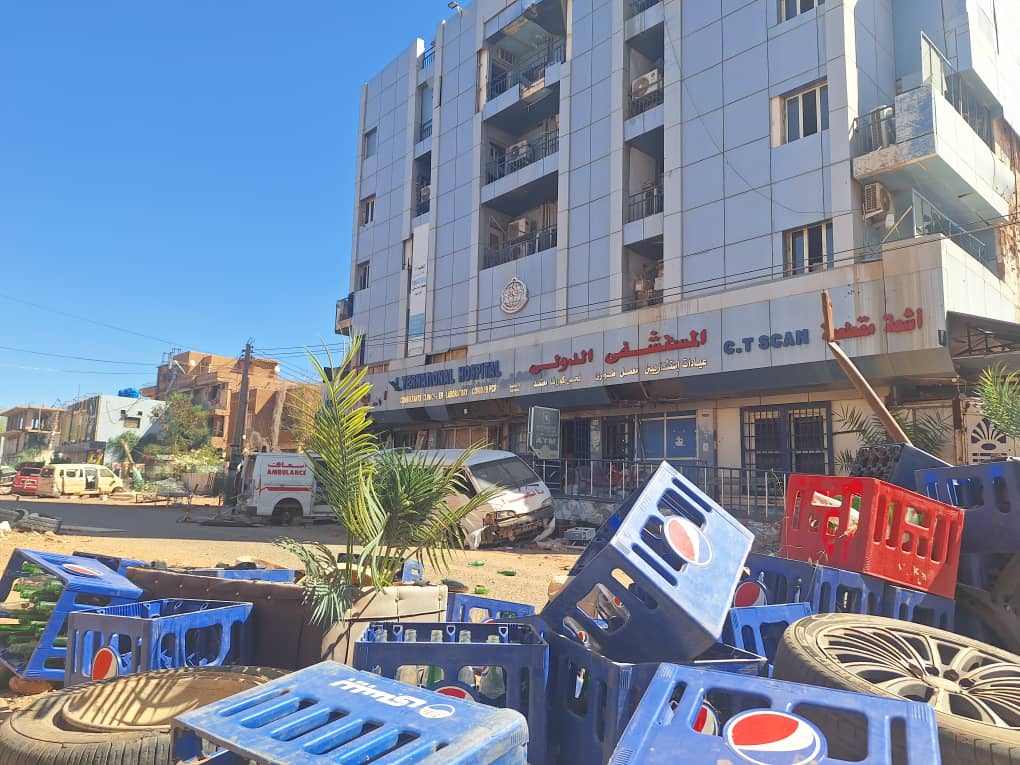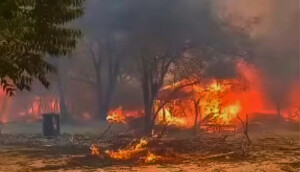Omdurman: Cholera ravages the city amid a worsening health crisis

Baraha Hospital in Khartoum Bahri January 2025 (Photo: Sudan Tribune)
Prepared by Sudan Tribune for Sudan Media Forum
Nour El Din is desperate as he struggles to save his family after his wife and two daughters contracted cholera in Omdurman, west of the Sudanese capital, which has become a major epicentre of the epidemic’s spread across the country.
Nour El Din, 50, who recently recovered from cholera, expressed his dissatisfaction with the level of medical care at El Naw Government Hospital in central Omdurman. He continues to treat his family members, incurring exorbitant expenses by purchasing intravenous solutions from the parallel market at double the price. This situation worsened after the Federal Ministry of Health decided to close the isolation centre at El Naw Hospital on Wednesday evening, following the outbreak of the disease in the hospital’s vicinity and the increase in infections in the area.
What is cholera?
Cholera is an acute bacterial disease caused by ingesting food or water contaminated with the bacterium Vibrio cholerae. The disease is characterised by acute watery diarrhoea that can rapidly lead to severe dehydration and shock. If not treated promptly, it can be fatal within hours. The main symptoms include profuse watery diarrhoea (often described as resembling rice water), vomiting, and leg cramps. Prevention of cholera relies primarily on the provision of safe drinking water, good sanitation practices, and personal hygiene, as well as vaccination in endemic areas.
The United Nations Children’s Fund (UNICEF) stated in a recent press release that “cholera cases in Khartoum increased from 90 cases per day to 815 cases per day between May 15 and 25, a nine-fold increase in just ten days.”
Poor medical services
Hafiz Nour El Din (presumably someone other than the first-named Nour El Din or the relationship is unclear), his wife, and two daughters contracted cholera less than a week ago in Omdurman. Speaking to Sudan Tribune, Nour El Din described his intense struggle to provide treatment for his family, stressing that although they received initial assistance at El Naw Hospital, he is still struggling to meet their other medical needs. He described the current situation as “critical,” despite the efforts of doctors and volunteers at the hospital, which is receiving an increasing number of patients daily.
Isolation centre closure
Sudan Tribune reported that the Federal Ministry of Health closed the isolation centre at Alnaw Hospital on Wednesday evening due to the spread of the disease in its vicinity and the increasing number of cases in the area. The sources reported that officials from the Federal and State Ministries of Health visited Alnaw Hospital over the past two days and decided to close the isolation centre due to the spread of the disease around the hospital, where the number of infections reached 500 and more than 100 deaths. The sources confirmed that cholera patients were transferred from the isolation centre at Alnaw Hospital to Bashair, Alban Jadeed, Umm Badda Model, Omdurman Teaching, El Amin Hamid, El Turki and El Saudi hospitals.
New cases and expanding spread
Fatima Ahmed, from the El Jili area north of Khartoum, reported that four members of her family were infected with cholera and have been in the isolation centre at Ombada Model Hospital for two days. Speaking to Sudan Tribune, Fatima expressed her fears of the epidemic spreading among residents amid the lack of medical services in the area. Sources who spoke to Sudan Tribune said that suspected cases have also emerged in the Halfaya area due to the use of contaminated water and the deteriorating environmental conditions in the area.
Increasing numbers of infections and deaths
In a related context, the Humanitarian Sector of the Forces for Freedom and Change (FFC) Alliance revealed that cholera cases have risen to 8,000, while the death toll has reached 200 over the past three days.
The sector explained in a statement that the emergence of eight cholera cases, including one death, in South Darfur state represents a dangerous development that threatens to spread the epidemic to wider areas in Darfur. These areas are home to large numbers of displaced persons and refugees living in extremely difficult health conditions, in addition to being affected by the ongoing war. The humanitarian sector called for the implementation of an urgent response plan to contain the spread of the disease.
The sector called on government authorities to declare a state of health emergency, particularly in Khartoum state, which it considered a “disaster zone” due to the shortage of supplies, the significant increase in deaths, and the difficulty of controlling the spread of the disease. Furthermore, the effects of war and the destruction of service infrastructure are hindering effective responses to the pandemic.
Cases rise after field developments in Khartoum
Federal Minister of Health Dr. Haitham Mohamed Ibrahim revealed that cholera outbreaks in Khartoum state have reached 1,000 cases per day, with a mortality rate ranging between 2% and 3%.
The minister said in a statement to Sudan Tribune that there has been an increase in cholera infections after the liberation of the El Saliha area, the announcement that Khartoum was free of the Rapid Support Forces, and the return of large numbers of citizens to their homes. The average number of cases has risen to 1,000 per day, and the death rate ranges between 2% and 3%.
The minister added that most deaths occur before reaching isolation and treatment centres or in the late stages of the disease, confirming the problem of prompt rehydration and adequate fluid intake at the onset of symptoms. He added, “We aim to reduce the mortality rate as much as possible to less than 1% in the coming days.”
Urgent interventions from the Ministry of Health
The minister noted a decline in the epidemiological curve over the past two days as a result of urgent interventions. He confirmed the provision of pharmaceutical supplies, including more than 100,000 intravenous (IV) solution kits and other treatment protocol medications. The World Health Organisation also provided 15 tons of medications, while UNICEF provided chlorine for water purification.
The minister noted the opening of more than 10 isolation centres with a total bed capacity exceeding 800 beds, and several organisations are working to operate these centres. He also announced the receipt of 2.9 million doses of cholera vaccine allocated to the affected localities in Khartoum.
He explained that a number of cholera cases had been detected in other states, adding that they were “sporadic cases, most of which originated from Khartoum, and efforts are being made to fully control them through monitoring to prevent the epidemic from spreading to other states.”
It’s worth noting that a new wave of cholera has spread to Omdurman, Khartoum state, after residents resorted to using unsafe water due to the shutdown of water stations following a drone attack by Rapid Support Forces on power stations, which resulted in power outages.

This report is prepared by Sudan Tribune and published via the platforms of Sudan Media Forum member organisations, to highlight the challenges facing civilians in Khartoum state as they combat the spread of epidemics and diseases amid a complete lack of access to medicines and healthcare services.
#SilenceKills #الصمت_يقتل #NoTimeToWasteForSudan #الوضع_في_السودان_لايحتمل_التأجيل #StandWithSudan #ساندوا_السودان #SudanMediaForum











 and then
and then